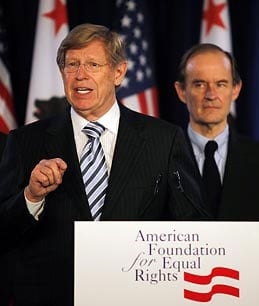More than any single vote, more than any single veto, more than any single legislative majority, the Ninth Circuit's decision in Perry v. Brown is the most significant advancement in the fight for marriage equality in American history to date. Consider this: Never before has a federal appellate court affirmed any of the conclusions that the Ninth Circuit did today:
- that denying committed gay couples their right to marry cannot encourage opposite sex marriages;
- that when a state denies the right to marry while allowing gay couples all the rights and privilges of marriage, it cannot base the marriage ban on any rationale that denigrates gay parents;
- that domestic partnerships are unequal to marriage;
- that, as a matter of law, marriage rights do not hinge on natural procreative ability;
and, of course,
- that a ban on same-sex marriage unconstitutional.
 Today's opinion was both broad and narrow, with wide implications and constrained effects. In 76 pages, Judge Reinhardt and Judge Hawkins affirmed the district court's opinion that Proposition 8 was unconstitutional, but its decision hinged on the fact that Prop 8 effectuated a taking away of rights previously existing in California per In re Marriage Cases. That denial of an existing right violated due process and equal protection. The court declined to decide whether due process or equal protection would invalidate all bans on same-sex marriages, especially in those circumstances where no such right existed before. This is the narrow part of the decision. The court also used a rational basis standard of review, granted Proponents standing as a matter of federal law, and affirmed the denial of the motion to vacate. But, in so doing and by savaging the legitimacy of the Proponents' proferred reasons for Prop 8, the Ninth Circuit gave us a remarkable statement of gay rights, one that will have an enduring future regardless of the end result of Perry v. Brown.
Today's opinion was both broad and narrow, with wide implications and constrained effects. In 76 pages, Judge Reinhardt and Judge Hawkins affirmed the district court's opinion that Proposition 8 was unconstitutional, but its decision hinged on the fact that Prop 8 effectuated a taking away of rights previously existing in California per In re Marriage Cases. That denial of an existing right violated due process and equal protection. The court declined to decide whether due process or equal protection would invalidate all bans on same-sex marriages, especially in those circumstances where no such right existed before. This is the narrow part of the decision. The court also used a rational basis standard of review, granted Proponents standing as a matter of federal law, and affirmed the denial of the motion to vacate. But, in so doing and by savaging the legitimacy of the Proponents' proferred reasons for Prop 8, the Ninth Circuit gave us a remarkable statement of gay rights, one that will have an enduring future regardless of the end result of Perry v. Brown.
Judge Smith concurred, in part, and dissented, in part. He concurred in the standing and motion to vacate decisions, but dissented from the main merits holding, mostly using the traditional rational basis justification that given that low standard, he could not agree that there was "no conceivable" legitimate interest rationally related to Prop 8. Yet, his opinion is notable for the criticism he levies on some of the anti-gay arguments so common in this debate.
Analysis
This is a momentous decision, indeed. It is the first time a federal appellate court has recognized that a state cannot take away marriage rights from gay people. That holding, together with the courts conclusions about marriage law, children, gay equality, and domestic partnerships, work as precedent in all gay rights cases, not just same-sex marriage cases. Perry should be cited in upcoming appeals challenging the Defense of Marriage Act, in challenging employment discrimination, and the denial of basic entitlements.
Today's decision is also the only federal appellate court to say this:
It will not do to say that Proposition 8 was intended only to disapprove of same-sex marriage, rather than to pass judgment of same-sex couples as people. Just as the criminalization of "homosexual conduct … is an invitation to subject homosexual persons to discrimination in both the public and private spheres," so too does the elimination of the right to use the official designation of "marriage" for the relationships of committed same-sex couples send a message that gays and lesbians are of lesser worth as a class — indeed, that the enjoy a lesser societal status (73, internal citations omitted).
 Indeed, the Ninth Circuit's recognition that Perry is a proxy fight for the recognition of gay people as equal citizens belies the narrowness of its opinion. The denial of the recognition of marriage, whatever the history of that denial, harms gays who want to get married, but stigmatized all gay people as unworthy of recognition for who they are. Gays are, after all, being discriminated against because they are gay, and the court's narrow holding — limited to the circumstances of California — does not change the fact that Prop 8 is identity-based discrimination.
Indeed, the Ninth Circuit's recognition that Perry is a proxy fight for the recognition of gay people as equal citizens belies the narrowness of its opinion. The denial of the recognition of marriage, whatever the history of that denial, harms gays who want to get married, but stigmatized all gay people as unworthy of recognition for who they are. Gays are, after all, being discriminated against because they are gay, and the court's narrow holding — limited to the circumstances of California — does not change the fact that Prop 8 is identity-based discrimination.
But, we must admit that today's decision was narrower than it could have been, limited to the unique circumstances of California's gay marriage saga and how Prop 8 took away rights recognized by In re Marriage Cases.
Why did the court make that narrow holding? Federal courts are required to decide only the case before them — the Case or Controversy requirement; so, deciding any question not necessary for the resolution of the particular case at hand would exceed its jurisdiction. The Supreme Court and other federal appellate courts have long acknowledged the Constitutional mandate and social preference for narrow decisions. There could also be strategy involved. Any overstep, any overreach could be grounds for reversal at the Supreme Court or reconsideration by the broader Ninth Circuit. A victory for same-sex marriage in California would be a significant victory, and the Ninth Circuit's decision today is a huge leap forward toward that goal.
AFTER THE JUMP, I take you through the main points of the opinion and dissent, discuss a few lasting implications, and answer questions about where we go from here. Please add your questions in the comments, and I will do my best to respond to them as soon as possible. Stay tuned for updates during the day as I add responses to questions at the end.
CONTINUED, AFTER THE JUMP…
Standing
Previously, I argued that regardless of the California's Supreme Court's decision that Proponents had standing as a matter of state law to represent the State in Perry, that the proper decision as to federal standing would be denial, because Proponents could not show particularized harm to them from overturning Prop 8.
The Ninth Circuit took a different, yet sound, approach and granted Proponents standing. Judge Reinhardt said that federal courts have to accept who a state says can represent it in court. That much we know from Karcher v. May (NJ case, where the Speaker of the State House and President of the Senate were designated). All a federal court has to decide for federal standing in a case where the state declines to participate is whether the State suffered sufficient harm and that the State has authorized another party to represent it (24).
That is, Proponents would not have to show they were harmed; rather, they would merely have to show that California was harmed and they were taking the governor's and attorney-general's place.
Since Arizonans for Official English (AZ case, involving a group of initiative proponents seeking standing) expressed "grave doubts" that initiative proponents could be designated to fill the state's shoes without authorization, the Ninth Circuit asked the California Supreme Court if Proponents would have standing. Since that court determined that the initiative power included a right to defend, the Ninth Circuit concluded that such a decision sufficed for standing authorization (29).
Merits
Judge Reinhardt takes us through a brief history of marriage law in California and notes that from the time marriage was statutorily limited to opposite-sex couples in the 1970s and In re Marriage Cases, which granted gay couples the right to marry under California law, the state had created and expanded its domestic partnership law and expanded rights of adoption, access to entitlements, and protected gay people from harassment and discrimination, thus creating a legal regime where California felt that gay people had all the rights of marriage without the designation.
When Perry challenged Prop 8, it did so on three grounds:
1) that Prop 8 violates Due Process because it deprived gay California's of their fundamental right to marry, a right deemed fundamental by a long string of Supreme Court cases;
2) that Prop 8 violates Equal Protection because it singled out one class of persons for a particular disability without any legitimate rationale;
3) that Prop 8 also violates Equal Protection because it took away an existing right to marry, which constitutes a distinct violation because the Equal Protection Clause protects minorities from being deprived of rights by the state.
Because the court made its decision on this third ground, it had no occasion to address the broader arguments that any denial of marriage rights to same-sex couples would violate due process or equal protection or that the fundamental right to marry extends to gay people. Before we analyze why the court decided this case on narrow terms (see Analysis section below), let's finish the summary of the argument.
Prop 8 did something very simple, then. It took "marriage" away from gay people, but left every other right associated with domestic partnerships, adoptions, and so on intact (35). In doing so, Prop 8 was narrow, but exceedingly harmful (37): Prop 8 took away something vital, an institution that is so essential to human life and dignity, and picked out one group that is not worthy of recognition. To illustrate this, Judge Reinhardt inserted a little levity, noting that Marilyn Monroe's "How to Marry a Millionaire" wouldn't have quite the same impact if it were called "How to Register a Domestic Partnership with a Millionaire" (38).
So, the question was whether the people of California had a legitimate reason to enact a constitutional amendment that served only to take away the right of same-sex couples to dignify their relationships with the word "marriage"? The court said no, and its basis was a comparison to the case of Romer v. Evans. In Romer, the people of Colorado passed Constitutional Amendment 2, banning any legislative or executive or judicial body in the state from enacting an anti-discrimination law that included sexual orientation. The Supreme Court found no legitimate rational basis for doing so, inferring that it could only have been based on animus toward gays and nothing more, a rationale the U.S. Constitution cannot abide. Judge Reinhardt admitted that Romer was broader, but, like Amendment 2, Prop 8 "worked a meaningful harm" on a unique class of persons by withdrawing a right, treating one group unequally, and gave one group a special and unique legal disability (46).
California had no legitimate basis for doing so because any supposed rationale was not sufficiently connected to the effect of Prop 8. All Prop 8 did was deny gays the opportunity to solemnize their unions as "marriages." A significant harm indeed, but because Prop 8 left untouched adoption law, domestic partnership law, entitlement law, parental rights law, and a host of other areas, it could not be rationally related to any State objective, such as California's interest in childrearing and responsible procreation, the interest in proceeding with caution with marriage law, protecting religious freedom, and preventing children from being taught about same-sex marriage in school (55). The Ninth Circuit rejected each of these (and then some), making it the first federal appellate court to divorce this tired canards from marriage as a matter of law.
Even if children were better off with one-mom-and-one-dad households, Prop 8 had no effect on where children end up because it made no changes to the rights of gay people to adopt, use surrogates, or have parental rights (56-57). The court also found that denying gays the right to marry could not be rationally related to the government objective of encouraging heterosexuals to get married and have children in wedlock because taking away the rights of one group cannot legitimately encourage another to exercise those rights. The "proceed with caution" argument made little sense, as well, especially since Prop 8 was radical — it took away rights, rather than maintain the status quo (65). And, the possible rationale, stated during the Prop 8 campaign, to return to the way things were before In re Marriage Cases, was illegitimate as a matter of law: you cannot strip away new rights simply because they are new (70-71). Given the illegitimacy of all these conceivable rationales, the court was left to infer animus as a motivating factor and, per Romer, animus toward gays is an inappropriate reason for acting under the law. The court's animus conclusion was buttressed by its extended citation of the rhetoric associated with passing Prop 8, as well.
The main disagreement between the majority and dissent is that Judge Smith would accept the possibility that even if the science was bad and even if connection between Prop 8 and promoting opposite-sex marriage is dubious, the people of California could still have rationally believed the connection and, therefore, had a rational basis for passing Prop 8. He felt that the majority put too much reliance on Romer, especially given how much broader the harm imposed by Amendment 2 was compared to Prop 8.
Notably, though, the dissent rejected the proposed "responsible procreation" for Prop 8. Proponents argued that Prop 8 advances the state interest in promoting procreation within marriage because (a) only opposite-sex unions risk having unplanned pregnancies out of wedlock, then (b) only opposite-sex couples need to be encouraged into marriage. Hence, the law has always made the distinction between opposite-sex and same-sex couples with regard to marriage. Judge Smith criticized that argument: Since Prop 8 took away a designated right, there could not any new rationale for the discrimination caused by Prop 8.
Motion to Vacate
All judges agreed that Judge Ware did not err when he denied the motion to vacate. Denials of motions to vacate are reviewed for "abuse of discretion," which means that the Ninth Circuit had to only decide if Judge Ware was way off the mark. Since he clearly was not — there was no need for Judge Walker to recuse himself because he is gay, was in a long-term relationship, and could possibly want to marry in the future — the denial of the motion to vacate was affirmed.
Responses to Questions:
1. Can gay people marry in California right now?
No. The stay is still in place.
2. Since the Ninth Circuit's jurisdiction covers more than just California, how does this decision affect Idaho, Nevada, Washington, and other states?
There are lots of states in the Ninth Circuit: Alaska, Arizona, California, Hawaii, Idaho, Montana, Nevada, Oregon, Washington (and Guam and the Northern Mariana Islands). But, this decision was narrowly focused on the unique situation in California that precipitated Prop 8. Even if that were not the case, an appellate court decision can, but need not, immediately change the law in the entirety of its jurisdiction. Because of the ongoing stay and the limited focus to California, this decision has no immediate effect on the other states in the Ninth Circuit's jurisdiction.
3. What happens now?
Right now, attorneys are reading this decision. It's long, which explains my delay today. Though I cannot speak to Proponents' strategy, they can make a motion for rehearing in front of the broader Ninth Circuit (11 judges). If a majority of the circuit judges agree to rehear the case, we would stay at this appellate level and do this again in front of a larger panel. Proponents could also skip that step and go directly to the Supreme Court.
***
Ari Ezra Waldman is a 2002 graduate of Harvard College and a 2005 graduate of Harvard Law School. After practicing in New York for five years and clerking at a federal appellate court in Washington, D.C., Ari is now on the faculty at California Western School of Law in San Diego, California. His research focuses on gay rights and the First Amendment. Ari will be writing weekly posts on law and various LGBT issues.
Follow Ari on Twitter at @ariezrawaldman.




